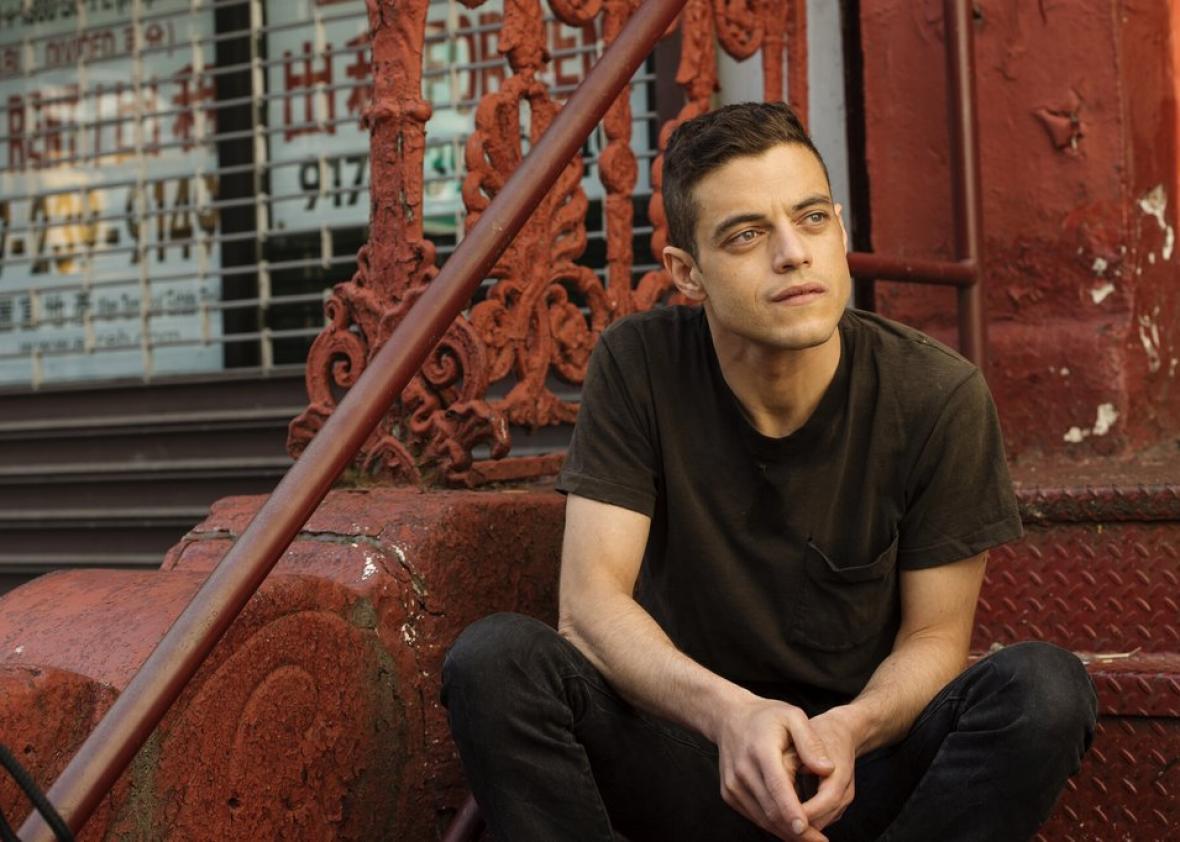In “Unmask,” the second-season premiere of Mr. Robot, Elliot (Rami Malek) is keeping a tenuous grip on sanity, but he’s menaced by intrusive thoughts. His nonexistent alter ego (Christian Slater) keeps turning up uninvited, visiting violence upon Elliot or those who threaten him, so much that it becomes routine. After Mr. Robot blows Elliot’s brains out with a handgun, Elliot nonchalantly scribbles in his journal, “He shot me in the head again.”
Mr. Robot, as a show, has porous boundaries, whether it’s soaking in current events or regurgitating half-digested chunks of Fight Club. But in “Unmask,” the show latched onto a particularly inspired reference point. As the literally shadowy figures who control the nation’s banks addressed Philip Price (Michael Crisfoter), the CEO of the malevolent E Corp, to explain why the country couldn’t bail out his beleaguered conglomerate, the only background noise was the faint hum of inside-the-Beltway air conditioning. But as Price rose to his feet, turning the tables on his would-be masters, a musical theme rose to buoy his words: Michael Small’s score from the 1974 thriller The Parallax View.
The Parallax View, which was directed by Alan J. Pakula, stars Warren Beatty as a reporter who unearths evidence of a massive conspiracy to assassinate political figures, the work of the sinister Parallax Corporation. It’s part of a wave of similarly paranoid thrillers that swept through movie theaters in the 1970s in response to post-1968 disillusionment and the bona fide conspiracy of Watergate: Pakula’s All the President’s Men, Francis Ford Coppola’s The Conversation, Sydney Pollack’s Three Days of the Condor, and many more. The influence of the genre in general and The Parallax View in particular on Mr. Robot has been noted many times, but this explicit homage—which Vulture’s Matt Zoller Seitz was one of few critics to point out in advance—takes us into a different realm, one where those past movies go from reference points to source material. It’s as if they’re trying to break through the surface of Mr. Robot, as if the show is being hacked as we’re watching it.
In substance, Price’s speech is hardly groundbreaking stuff, although it’s presented with the pomp and circumstance of a major revelation, recalling New York Times’ critic James Poniewozik’s deadly observation that watching Mr. Robot can be “like being cornered at a party by a guy who was blown away by this Intercept article he read.” It’s staged like a key monologue in 1976’s Network, the one where TV network head Ned Beatty explains to would-be revolutionary Howard Beale that “the world is a business.” Price’s explanation of how the stock market and the economy work—and why the government has to give his company yet another bailout—is similarly entry-level. “Every day when that market bell rings, we con people into believing in something,” he says. “The American Dream. Family values. Could be Freedom Fries for all I care. It doesn’t matter as long as the con works and people buy and sell whatever it is we want them to. If I resign, then any scrap of confidence the public is already clinging on to will be destroyed. And we all know a con doesn’t work without the confidence.”
The writing here is Mr. Robot at its worst, regurgitating Econ 101 lessons as if they’re closely guarded secrets. (The idea that stocks rise and fall with investor confidence is pretty much a definition of how the market functions.) But Cristofer—who, incidentally, is also a Pulitzer- and Tony-winning playwright —gives it all he’s got, biting down on the con in confidence like it’s his last meal. There’s a deliberate unnaturalness to his performance, which, coupled with the creeping dread of that borrowed score, throws the whole scene productively off kilter, making us doubt our eyes as much as Elliot does his.
In the lead-up to the second season, USA has been at pains to stress Mr. Robot’s topical relevance, producing an hourlong special stressing the show’s realistic depiction of computer-hacking techniques and describing the series, somewhat optimistically, as “a cultural phenomenon.” But like the 1970s movies it draws on, the show is far more powerful as a psychological study of madness and obsession than as a pseudo-profound tract with Something Important to Say About Society.
What makes The Parallax View powerful isn’t it the notion that Lee Harvey Oswald and Sirhan Sirhan were both part of some ominous plot but the way Beatty plays a man who sounds crazier the closer he gets to the truth and the way Pakula and cinematographer Gordon Willis frame the world in ever-more-extreme and alienating ways. It forces us to see things as he does, to take on that feeling of madness. That’s what Mr. Robot does best, thanks especially to Rami Malek’s captivatingly unnerving performance as Elliot. In Season 2, we’re moving outside of Elliot’s head, seeing the world as it is and not as he imagines it. (In the first episode, we hear E Corp referred to by its real name, and not “Evil Corp,” Elliot’s preferred moniker.) But that’s a dangerous place for it to go, since Mr. Robot’s version of the real world is a lot less interesting than Elliot’s delusion.
